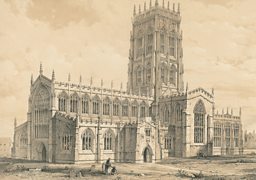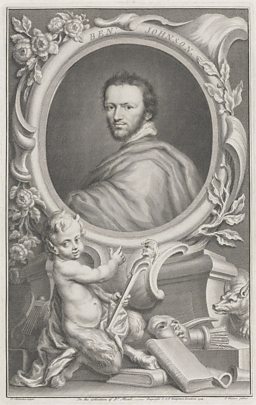Shakespeare's 'The King's Men' in Doncaster
Although there are few records of the the King's Men visiting Yorkshire during Shakespeare's life, after his death it's a different story.
Most of Shakespeare’s career as an actor and playwright was spent with the Lord Chamberlain’s players who became the King’s Men in 1603 (following the accession to the English throne of James I).
-
![]()
Much ado near me
Hear more Shakespeare stories on BBC Radio Sheffield
-
![]()
Shakespeare Festival 2016
The BBC celebrates the genius of the bard

By Dr Siobhan Keenan, Reader in Shakespeare and Renaissance Literature - De Montfort University, Leicester
There are few records of the company touring in Yorkshire during Shakespeare’s lifetime but they are known to have paid regular visits to the region in the years shortly after his death.

Alongside York, one of the regular stopping points for touring playing companies in Yorkshire was Doncaster and this is true of the King’s players, too. There are records of companies identified as the King’s Men being rewarded by the local corporation at least twelve times between 1620 and 1636.
We do not know where the players performed, but one suggestion is that the usual venue for large civic events was the capacious local church, St. George’s. The medieval church no longer survives (having burned down in a fire in 1853) but contemporary illustrations give an idea of its scale. If the Doncaster authorities had wished to, they could have opened the civic-sponsored performances to the whole community, the church’s spacious interior being easily capable of accommodating a large audience, as it did during church services.
The plays performed by the visiting actors are not named in the civic accounts but we know that Shakespeare’s plays remained in the King’s Men’s repertory and were regularly revived in London and at court in the Stuart era. It is thus likely that they were in the touring repertory, too.
In 1624-5, for example, when the King’s Men were paid twenty shillings for visiting Doncaster, the London-based company’s court performances included productions of The Winter’s Tale and I Henry IV. It is thus possible that audiences in Jacobean and Caroline Doncaster had a chance to see not only the latest London plays when the King’s Men came to town, but a selection of Shakespeare’s plays, as they continued to enjoy a theatrical life in the King’s Men’s repertory right up until the closure of the theatres at the start of the English Civil Wars in 1642.
Doncaster offers a lucrative welcome
By Ted McGee, co-editor at REED/ Professor Emeritus - University of Waterloo, Ontario
Though a long walk from London, Doncaster was worth the trip for travelling actors such as those in Shakespeare’s final company, the King’s Men. When they performed there in 1620, the Mayor gave them a reward of 20 s.
No other troupe that visited the town between 1552 and 1642 received a greater payment, and only Leicester's Men in 1574, the Queen's Men in 1575, and Queen Anne's company in 1615 matched it.
Besides the financial generosity of the civic authorities, the King's Men must have found in Doncaster a receptive audience, for they returned regularly, in every season of the year, and sometimes twice in the same year.
The welcome given so often to the King's Men was one manifestation of Doncaster's long, lively history of performance of various kinds. These included Corpus Christi plays and pageants, for which local trade guilds were responsible each year.
When these shows declined or were suppressed (perhaps as late as 1582), the payments to adult acting companies, children's companies, jesters, trumpeters, waits, and other musicians began. Other towns and villages succumbed to religious pressure to give up their ancient local customs, but Doncaster kept its maypole and sometimes built a summer tree.
Throughout the entire period the constant is Doncaster's appreciation of music. Several young people were apprenticed to local musicians. Other musicians were conscripted for the performance of libellous songs, such as "The Devil of Doncaster"- a song about a civic leader who was allegedly, like Shylock, a money-lender but not a Jew.
When Shakespeare's fellow playwright Ben Jonson visited Doncaster on his journey to Edinburgh in 1617, he and his companions were led into the town by a bagpiper. Most important of all were the town waits, a part of Doncaster's scene from 1457 onwards. They played in the school, in other towns, at nearby stately homes and, of course, on occasions of civic festivity in Doncaster. The town provided them with coats, paid them an annual wage, and required in return that they conduct their daily watch from Michaelmas to Shrove Tuesday, wear their liveries on feast days, and be available during the Christmas to enhance the celebration of the season.
The City and the citizens of Doncaster clearly enjoyed and valued their culture of performance - a culture created by local players and by companies, like the King's Men, from much farther afield.
Shakespeare on Tour
From the moment they were written through to the present day, Shakespeare’s plays have continued to enthral and inspire audiences. They’ve been performed in venues big and small – including inns, private houses and emerging provincial theatres.

BBC English Regions is building a digital picture which tracks some of the many iconic moments across the country as we follow the ‘explosion’ in the performance of The Bard’s plays, from his own lifetime to recent times.
Drawing on fascinating new research from Records of Early English Drama (REED), plus the British Library's extensive collection of playbills, as well as expertise from De Montfort University and the Arts and Humanities Research Council, Shakespeare on Tour is a unique timeline of iconic moments of those performances, starting with his own troupe of actors, to highlights from more recent times. Listen out for stories on Shakespeare’s legacy on your BBC Local Radio station from Monday 21 March, 2016.
You never know - you might find evidence of Shakespeare’s footsteps close to home…
Craig Henderson, BBC English Regions
-
![]()
Shakespeare Lives
The nation’s greatest performing arts institutions mark 400 years since the Bard's death
Related Links

Telling the story of Shakespeare in Sheffield.
-
![]()
Ira Aldridge stars in Doncaster
The African Roscius plays in Doncaster's Theatre Royal
-
![]()
Shakespearean acting royalty delights Yorkshire
Sarah Siddons, at the end of her acting career performs, in Doncaster Theatre
Shakespeare on Tour: Around the country
-
![]()
The 1809 ticket price riots
The most famous riots in the history of theatre
-
![]()
Cambridge students put on a Christmas satire
Shakespearean style 'Footlights'
-
![]()
North West's influence on Shakespeare's success
Plus, the small Cheshire town that attracted Shakespeare's players
-
![]()
Salisbury shadows play Shakespeare
A dreamy performance of Shakespeare









